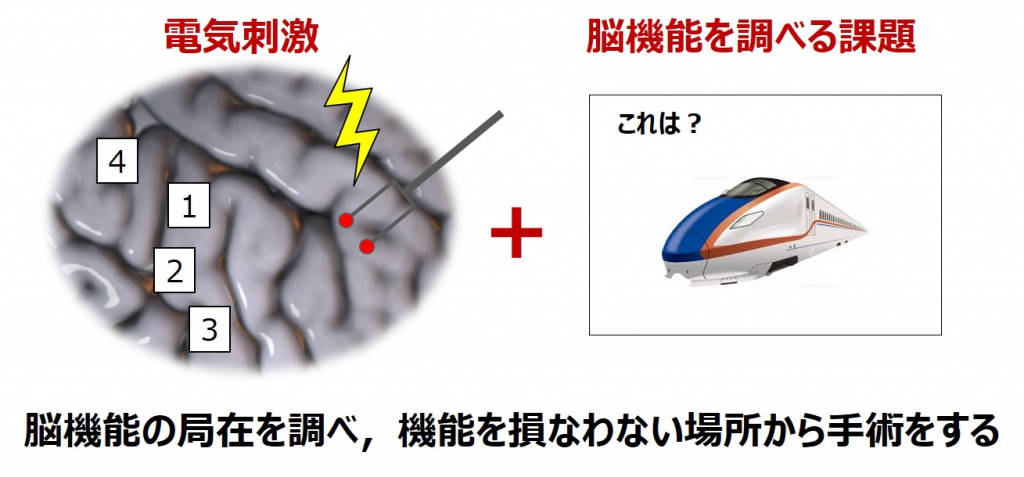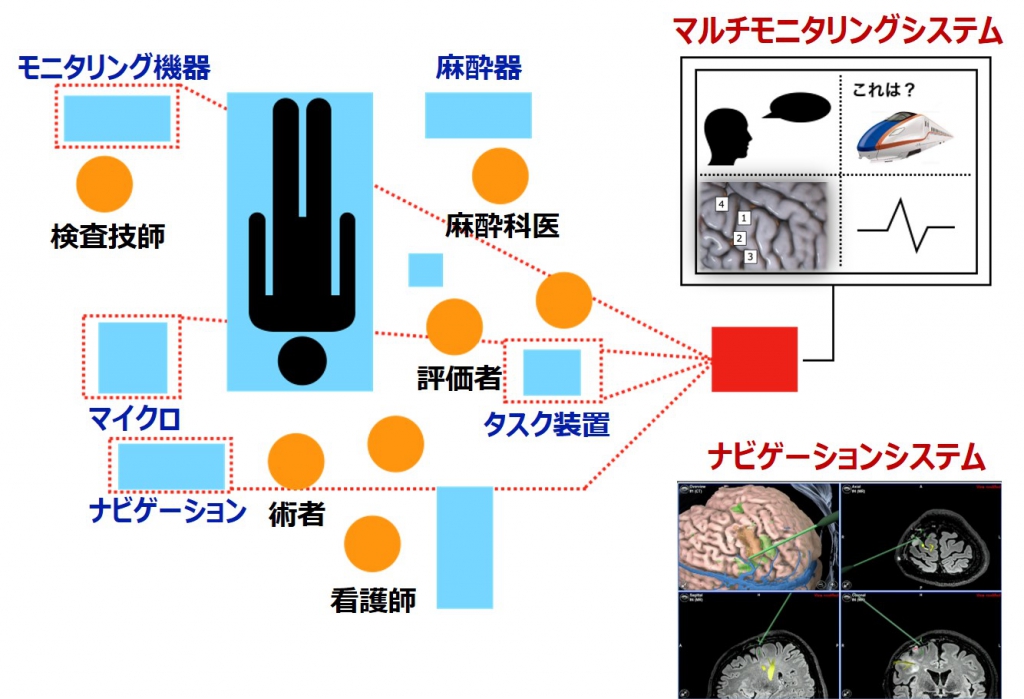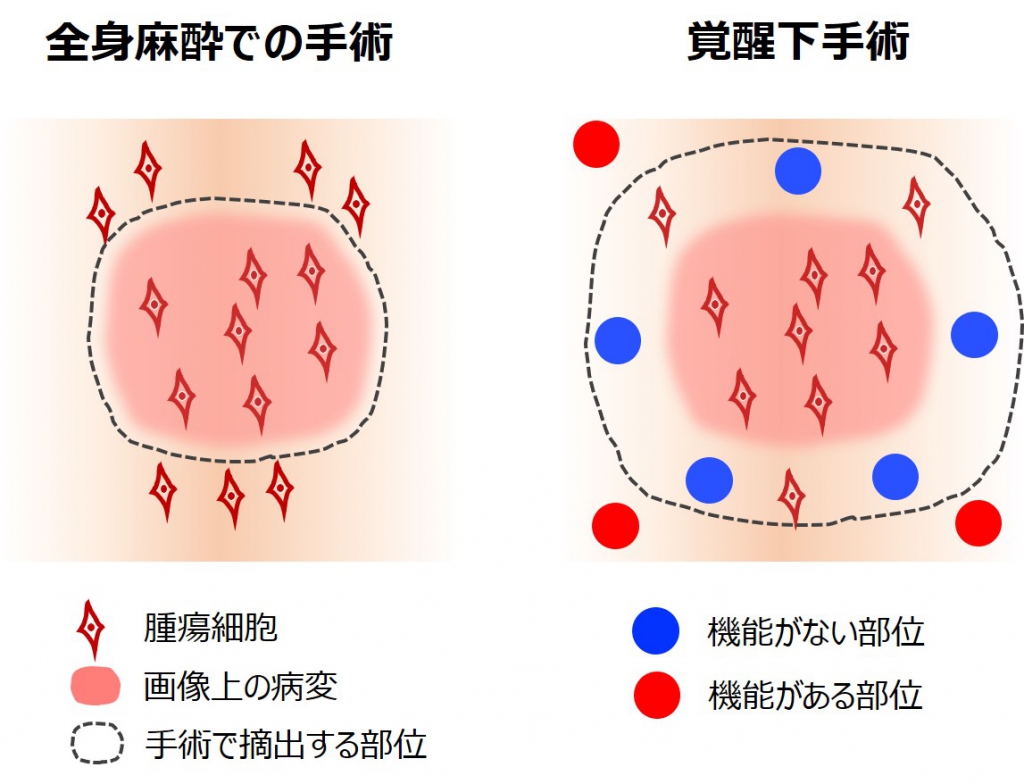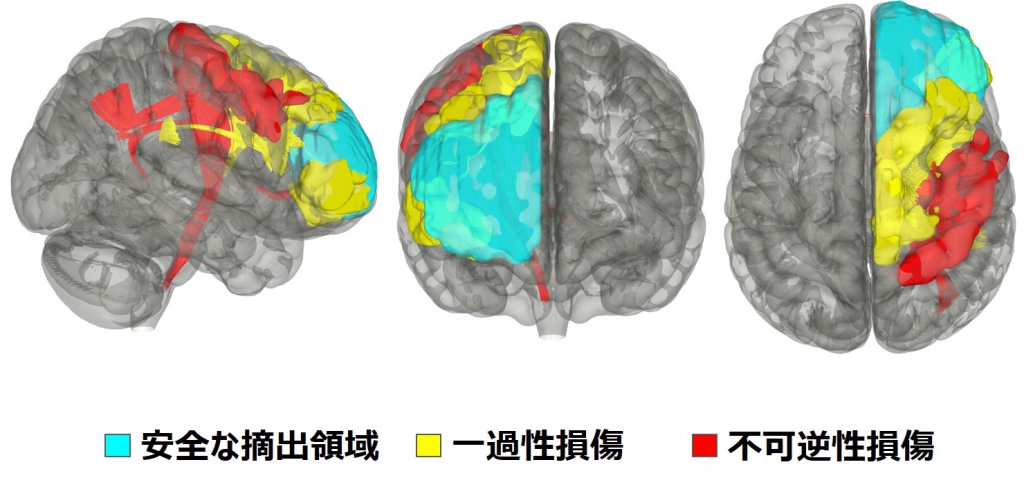Clinical Information
Neurosurgery to preserve and improve brain function
Awake Surgery
Two important aspects of brain tumor surgery are to remove as much of the tumor as possible to prolong the life of the patient and to preserve as much of the brain’s function as possible to avoid postoperative complications. In other words, we believe that it is important to remove the lesion and at the same time to ensure the patient’s quality of life (QOL), which is the ability to live a satisfying life after the surgery. One of the methods of the surgery is called “awake surgery”. Awake surgery is a surgical procedure in which the patient is awakened during the operation to determine where the important functions of the brain are located so that they are not impaired.
Exercise: moving arms and legs, vocalizing, swallowing
Senses: tactile, deep sense, visual
Language: Speak and understand the language.
Working memory: doing multiple things at the same time
Visuospatial perception: Seeing things accurately
Memory: remember what you see and hear
Mentoring: Understanding people’s emotions, reading the atmosphere
1) Admission to hospital
2) Preoperative evaluation (CT, MRI, functional MRI, higher brain function tests)
3) Visit to the anesthesiologist
4) Simulation in the operating room
5) Surgery under awakening
1) Craniotomy under general anesthesia (no shaving)
2) Awakening, functional brain mapping, and tumor removal
3) Closing the head with general anesthesia
6) Postoperative evaluation (MRI, higher brain function tests) and rehabilitation, if necessary.
7) Discharge
After surgery, additional treatment and rehabilitation may be required depending on the type of tumor and symptoms, but our goal is to return to society as soon as possible (return to the same lifestyle as before surgery). We also try to minimize cosmetic problems by performing shave-free surgery without shaving the hair.
In addition to the neurosurgery department, the staff of the Department of Neurosurgery, the Department of Anesthesiology, the Department of Rehabilitation, the Department of Clinical Investigation, and the Department of Nursing collaborate with each other to perform the waking surgery. The surgery is performed using state-of-the-art medical equipment such as the latest neuronavitation system, electrical stimulator, multi-monitoring system, and fluorescence-guided microscope.
Why is awake surgery necessary?
Complex brain functions that exist only in humans, such as language, visuospatial cognition, working memory, and emotions, can be preserved only by awake surgery. It has also been shown that awake surgery can be expected to provide both a high rate of tumor removal and good postoperative brain function at the same time. This is because general anesthesia can only remove the lesion on the image, but in awake surgery, if there is no brain function around the lesion, a large area around the lesion can be removed (figure below). It is better to remove a large lesion to prevent recurrence. However, depending on the nature of the tumor, preservation of brain function may lead to residual tumor, which increases the likelihood of future recurrence. We carefully determine the surgical plan, taking into account the location of each patient’s brain tumor, preoperative brain function, living environment, occupation, and wishes, and carefully considering what functions should be preserved.
What is it to “wake up in the surgery”?
During the operation, the patient is awakened from general anesthesia to local anesthesia. The local anesthesia is effective, so you will not feel any pain in the wound. Also, the brain itself does not feel pain. In most cases, they are as conscious as usual. He can talk, move his hands, and think in a normal way.
Although it is natural for everyone to feel uneasy, we have received comments such as “I was a bit tired, but I felt better than I expected,” “I wasn’t scared because the experienced staff was nearby,” and “I didn’t expect to go home so soon after having a head operation” from patients after the surgery. The most important thing for us is to build a relationship of trust with patients, and we strive to provide safe and secure medical care.
What are the indications for awake surgery?
Depending on the age of the patient, the type of tumor, and the location of the tumor, awake surgery may or may not be appropriate for the patient. The brain must be intact prior to surgery, and it is expected that the brain function can be preserved by waking surgery. However, we do not give up on the case when the surgery is difficult to perform under general anesthesia, but perform electrophysiological examination under general anesthesia to preserve the minimal amount of function. Please consult with your doctor to determine the indications for awake surgery.
About Clinical Research
We are investigating the functional localization of the brain, neural networks, and the mechanism of recovery of brain functions (plasticity) based on neuroimaging, neuroanatomy, and electrophysiology. We have found new insights into the neural networks involved in complex human brain functions such as visuospatial cognition, working memory, and mentalizing, and have reported them in our laboratory. We have also discovered a new structure of the brain that may explain the currently unexplained mechanism of recovery of brain function. These discoveries can be fed back to the next operation to establish safer surgeries, and can make a significant contribution to the treatment of people with the same diseases around the world. We are doing our best to advance the technology for each surgical case in order to provide treatment that focuses on the quality of life (QOL) of the patient.




